非谓语动词易错点(超权威)
高考非谓语动词总结以及易错点

高考非谓语动词总结以及易错点一、单项选择非谓语动词1.(北京)___________the early flight, we ordered a taxi in advance and got up very early. A.Catching B.CaughtC.To catch D.Catch【答案】C【解析】【详解】考查非谓语动词。
句意:为了赶上早班的飞机,我们提前叫了出租车并且起得很早。
这里逻辑主语是we,空中用不定式作目的状语,表示提前交出租车并且早起的目的。
故选C。
【名师点睛】此题应抓住逻辑主语与从句的关系,然后从句意中看出句子中缺少的成份,可以知道这里用不定式做目的状语,意思是“为了…”,学生需要注意非谓语动词中现在分词、过去分词、不定式和各种动词在句子中做的成份,才可以做好此类题。
2.The press should expand its influence in international public opinion to make China’s voice better ______ in the world.A.hearing B.to be heardC.hear D.heard【答案】D【解析】【详解】考查非谓语动词。
句意:新闻应该扩大其在国际舆论中的影响力,使中国的声音更好地在世界上被听到。
“中国的声音”与“听到”之间是被动关系,用make sth. done结构,故选D。
3.I’m afraid that I can’t attend Tom’s wedding party ______ next weekend.A.to be held B.being heldC.held D.is to be held【答案】A【解析】试题分析:考查非谓语动词作定语。
句子中已经有了谓语can't attend,故此处应填非谓语动词,首先排除D。
hold与party构成被动关系,但ABC答案均表被动。
非谓语动词考点易错点的总结

非谓语动词考点易错点的总结一、单项选择非谓语动词1.Urban Chinese travelled to 68 countries during the Spring Festival holiday, ________ an average of 6,000 yuan each.A.spent B.spendingC.to spend D.having spent【答案】B【解析】【详解】考查非谓语动词。
句意:春节假期期间,中国的城市人去了68个国家旅行,平均每人花费6000元。
该句中的逻辑主语Urban Chinese与spend之间是主谓的关系,所以该空需用现在分词。
故选B项。
2.I’m afraid that I can’t attend Tom’s wedding party ______ next weekend.A.to be held B.being heldC.held D.is to be held【答案】A【解析】试题分析:考查非谓语动词作定语。
句子中已经有了谓语can't attend,故此处应填非谓语动词,首先排除D。
hold与party构成被动关系,但ABC答案均表被动。
因此再根据时间状语next weekend可确定填不定式表将来,故选A。
考查非谓语动词作定语时,要注意看与所修饰名词之间的关系,判断是主动还是被动。
同时还要注意从时间上判定,不定式作定语表将来,现在分词表进行,过去分词表完成。
考点:考查非谓语动词作定语。
3. He is thought ___foolishly .Now he has no one but himself to blame for losing the job. A.to act B. to have acted C. acting D.having acted【答案】B【解析】试题分析:句型“有人认为..已....”可用It is thought/ believed/ ...that sb have/has done...结构。
高考非谓语动词考点易错点的总结

高考非谓语动词考点易错点的总结一、单项选择非谓语动词1.--- What do you know made Sarah so upset?--- giving away state secrets.A.Charged with B.Being charged withC.Accusing of D.To be accused of【答案】B【解析】【详解】考查动名词。
句意:---你知道是什么让莎拉这么不高兴吗?---她被指控泄露国家机密。
sb be charged with“某人因…而被控告”。
第二句的主语为动名词Being charged with作主语,还可以用being accused of。
故B选项正确。
2.(天津) __________ for two days, Steve managed to finish his report on schedule.A.To work B.WorkedC.To be working D.Having worked【答案】D【解析】试题分析:句意:工作了两天,Steve成功的按时完成了他的报告。
句中的逻辑主语为Steve,与work之间为主动关系,故用现在分词,这里用having worked,表示动作的先后性。
故选D。
【考点定位】考查非谓语动词。
3.You can’t imagine what difficulty we had ________home in the snowstorm.A.walked B.walkC.to walk D.walking【答案】D【解析】考查have difficulty (in) doing sth.短语的变式运用。
difficulty在句中充当先行词,其后为定语从句。
答案:D4.Time, ________ correctly, is money in the bank.A.to use B.used C.using D.use【答案】B【解析】本题考察非谓语动词。
【备战高考】非谓语动词易错易混点
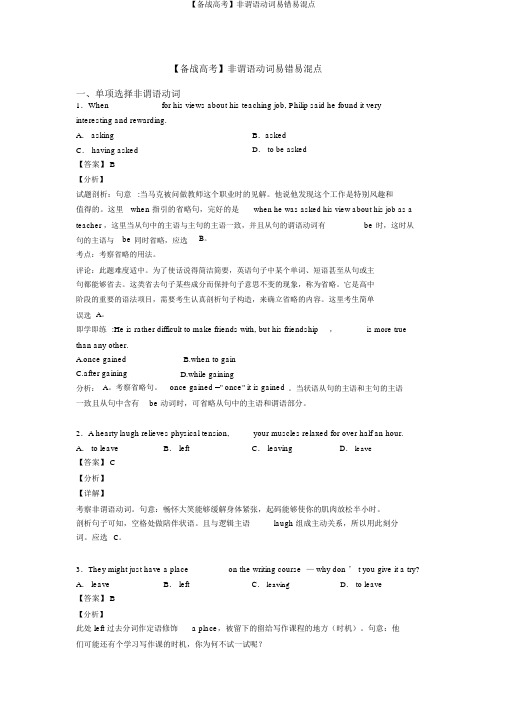
【备战高考】非谓语动词易错易混点一、单项选择非谓语动词1.When ___________ for his views about his teaching job, Philip said he found it very interesting and rewarding.A. asking C. having asked 【答案】 B B.asked D. to be asked【分析】试题剖析:句意:当马克被问做教师这个职业时的见解。
他说他发现这个工作是特别风趣和值得的。
这里when 指引的省略句,完好的是when he was asked his view about his job as a teacher ,这里当从句中的主语与主句的主语一致,并且从句的谓语动词有be时,这时从句的主语与be同时省略,应选B。
考点:考察省略的用法。
评论:此题难度适中。
为了使话说得简洁简要,英语句子中某个单词、短语甚至从句或主句都能够省去。
这类省去句子某些成分而保持句子意思不变的现象,称为省略。
它是高中阶段的重要的语法项目,需要考生认真剖析句子构造,来确立省略的内容。
这里考生简单误选A。
即学即练:He is rather difficult to make friends with, but his friendship, ______ is more true than any other.A.once gainedB.when to gainC.after gainingD.while gaining分析:A。
考察省略句。
once gained =" once" it is gained。
当状语从句的主语和主句的主语一致且从句中含有be 动词时,可省略从句中的主语和谓语部分。
2.A hearty laugh relieves physical tension, _____your muscles relaxed for over half an hour. A. to leave B. left C. leaving D. leave【答案】 C【分析】【详解】考察非谓语动词。
非谓语动词考点易错点的总结

非谓语动词考点易错点的总结一、单项选择非谓语动词1._______ with all sorts of affairs, the manager had little time to have a good sleep. A.Occupying B.Being occupiedC.Occupied D.Having occupied【答案】C【解析】【详解】考查非谓语动词。
句意:由于经理忙于各种事务,几乎没有时间好好睡一觉。
“经理”和“占用”之间是被动关系,用过去分词作原因状语,故选C。
2.Distinguished guests and friends, welcome to our school, _____the ceremony of the 50th Anniversary this morning are our alumni (校友) from home and abroad.A.Attend B.To attend C.Attending D.Having attended 【答案】C【解析】主句 .Distinguished guests and friends are our alumni (校友) from home and abroad. Attending the ceremony of the 50th Anniversary this morning非谓语动词作伴随状语。
3.China’s image is improving steadily, with more countries ________ its role in international affairs.A.recognizing B.being recognized C.to be recognized D.recognized【答案】A【解析】【详解】考查with复合结构。
句意:中国的形象正在稳步提升,更多的国家认识到中国在国际事务中的作用。
【备战高考】非谓语动词总结以及易错点
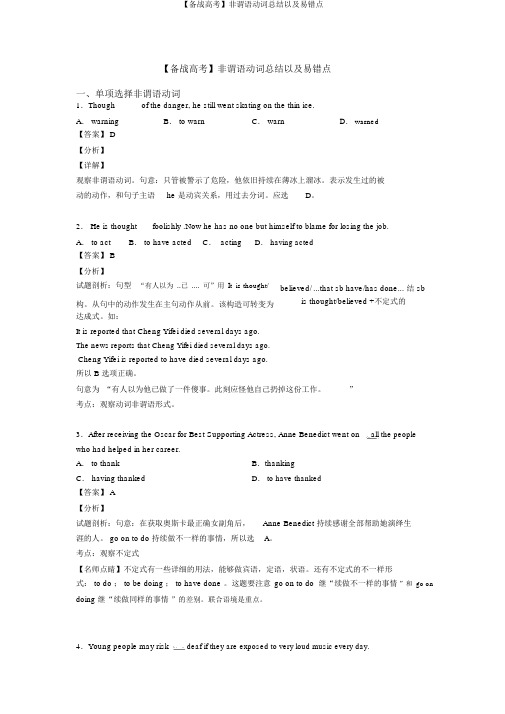
【备战高考】非谓语动词总结以及易错点一、单项选择非谓语动词1.Though _____ of the danger, he still went skating on the thin ice.A. warning B. to warn C. warn D. warned 【答案】 D【分析】【详解】观察非谓语动词。
句意:只管被警示了危险,他依旧持续在薄冰上溜冰。
表示发生过的被动的动作,和句子主语he 是动宾关系,用过去分词。
应选D。
2. He is thought ___foolishly .Now he has no one but himself to blame for losing the job. A. to act B. to have acted C. acting D. having acted【答案】 B【分析】试题剖析:句型“有人以为..已....可”用It is thought/构。
从句中的动作发生在主句动作从前。
该构造可转变为达成式。
如:It is reported that Cheng Yifei died several days ago. The news reports that Cheng Yifei died several days ago. Cheng Yifei is reported to have died several days ago.believed/...that sb have/has done... 结 sb is thought/believed +不定式的所以 B 选项正确。
句意为“有人以为他已做了一件傻事。
此刻应怪他自己扔掉这份工作。
”考点:观察动词非谓语形式。
3.After receiving the Oscar for Best Supporting Actress, Anne Benedict went on all the people who had helped in her career.A. to thank B.thankingC. having thanked D. to have thanked【答案】 A【分析】试题剖析:句意:在获取奥斯卡最正确女副角后,Anne Benedict 持续感谢全部帮助她演绎生涯的人。
非谓语动词作状语的易错点例析
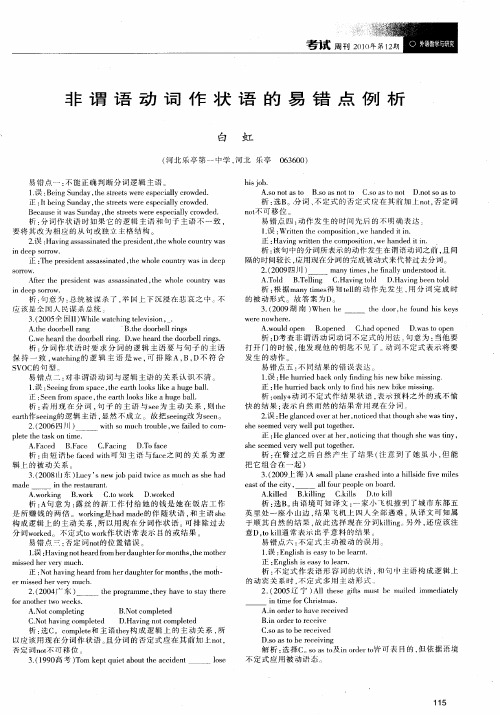
析 : 据 ma yt s 知 tl的 动 作 先 发 生 , 分 词 完 成 时 根 n me 得 i el 用 的被 动 形 式 。 故答 案 为D。 3 (0 9湖 南 ) e e .2 0 Wh n h
we eno r whe e r.
A. ul p n wo d o e B.pe e C. do n d o nd ha pe e D. st pe wa oo n
i e p s ro n d e or w.
析 : B 分 词 、 定式 的 否定 式 应 在 其 前 加 上n t 否 定词 选 。- 不 o, nt 可移位。 o不 易 错 点 四 : 作 发 生 的 时 间先 后 的不 明 确 表 达 : 动
1误 : rtntec mp st n, a d dii. . W ie h o oii Wel n e tn t o l
析 : 意为: 句 总统 被 谋 杀 了 , 圉上 下 沉 浸 在 悲哀 之 中 。 举 不 应 该是 全 国人 民 谋杀 总统 :
3 ( 0 5 国 I) hl ac igtlvso .2 0 伞 IW i w thn e iin, . e e
A.h o belr n t ed or l a g B.h o b l rng t edo r el i s C. a dt edo r l rng wehe r h o bel i .D. e r hed o b lrn s weh a d t o r el i g .
析 : 词 作 状 语 时 要 求 分 词 的 逻 辑 主 语 要 与 句 子 的主 语 分 保 持 一 致 . a hn 的 逻 辑 主 语 是 w , 排 除 A, D不 符 合 wt i c g e可 B,
【中考英语 易错题】易错点07 非谓语动词(解析版)
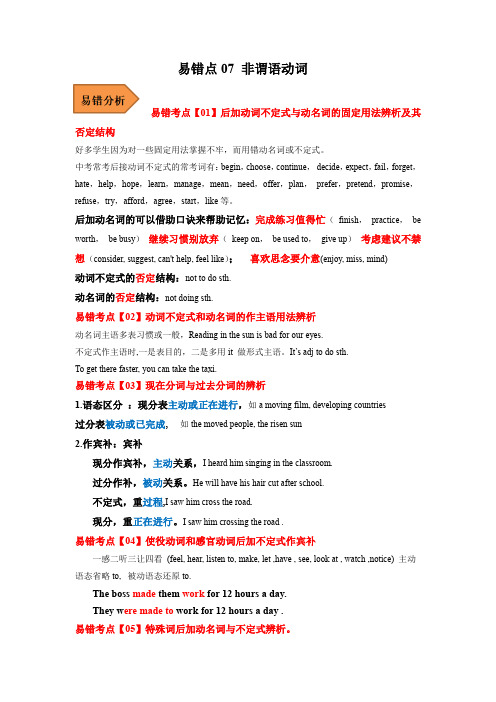
易错点07 非谓语动词易错考点【01】后加动词不定式与动名词的固定用法辨析及其否定结构好多学生因为对一些固定用法掌握不牢,而用错动名词或不定式。
中考常考后接动词不定式的常考词有:begin,choose,continue,decide,expect,fail,forget,hate,help,hope,learn,manage,mean,need,offer,plan,prefer,pretend,promise,refuse,try,afford,agree,start,like等。
后加动名词的可以借助口诀来帮助记忆:完成练习值得忙(finish,practice,be worth,be busy)继续习惯别放弃(keep on,be used to,give up)考虑建议不禁想(consider, suggest, can't help, feel like);喜欢思念要介意(enjoy, miss, mind)动词不定式的否定结构:not to do sth.动名词的否定结构:not doing sth.易错考点【02】动词不定式和动名词的作主语用法辨析动名词主语多表习惯或一般,Reading in the sun is bad for our eyes.不定式作主语时,一是表目的,二是多用it 做形式主语。
It’s adj to do sth.To get there faster, you can take the taxi.易错考点【03】现在分词与过去分词的辨析1.语态区分:现分表主动或正在进行,如a moving film, developing countries过分表被动或已完成,如the moved people, the risen sun2.作宾补:宾补现分作宾补,主动关系,I heard him singing in the classroom.过分作补,被动关系。
非谓语动词考点易错点的总结

非谓语动词考点易错点的总结一、单项选择非谓语动词1.It didn’t take a long time for the connection between the missing money and our partner’s new car ______.A.to make B.to be made C.making D.being made【答案】B【解析】本题考查非谓语动词的用法。
句意为“丢钱和我们伙伴的新汽车的关系很长时间才被发现”。
题干用了一个句型“It+takes/took+时间段+for+sb.+不定式”,表示“某人干某事花费了多长时间”,the connection和make之间是被动关系,因此,用不定式的被动形式。
故选B。
【名师点睛】汉语思维习惯和表达习惯是中国学生做英语试题的头号障碍,要克服这种障碍,必须理解动作和动作对象之间的语态关系。
本题考查的是短语make connection, make是谓语,connection作make的宾语,此题的难度是把make变成了被动语态的不定式。
2.In Australia, many road signs are now both in English and Chinese, ______ it easier for Chinese tourists to travel.A.making B.made C.make D.makes【答案】A【解析】考查状语从句。
在澳大利亚,许多路标都是用英文和中文同时标识,使中国游客去旅游更加容易。
根据与前面一句用逗号隔开,没有连词,故判断此空用非谓语动词,根据与主语是主动关系,故用动词-ing形式,用来修饰和补充上一句话,故选A。
3.115.______ his love, Chris sent his mom a thank-you note on Mother’s Day. A.Expressing B.Expressed C.To express D.Having expressed【答案】C【解析】考查动词不定式。
【英语】非谓语动词总结以及易错点

考查非谓语动词。句意:如果有很多工作要做,我很乐意一直把它做完。分析句子可知,用不定式做定语表示未发生的动作,放在被修饰词的名词、代词后,此处to do在句中做定语修饰work,主动形式表示被动含义,故选A。
13.________ the convenience of digital payment, many senior citizens started to use smart phones.
A.askingB.asked
C.having askedD.to be asked
【答案】B
【解析】
试题分析:句意:当马克被问做教师这个职业时的看法。他说他发现这个工作是非常有趣和值得的。这里when引导的省略句,完整的是when he was asked his view about his job as a teacher,这里当从句中的主语与主句的主语一致,并且从句的谓语动词有be时,这时从句的主语与be同时省略,故选B。
3.In 2012, Sun Yang became the first Chinese man _____ an Olympic gold medal in swimming.
A.winningB.to win
C.having wonD.being won
【答案】B
【解析】
【详解】
考查不定式作定语。句意:在2012年,孙杨成为第一个获得奥运会游泳比赛金牌的中国男运动员。当名词前面有序数词修饰或被修饰的词就是序数词的时候,通常要用不定式作定语。如the first to come and the last to leave,本句中Chinese man前面有序数词the first修饰,所以后面要用不定式作定语。故B项正确。
高考英语非谓语动词易错知识点
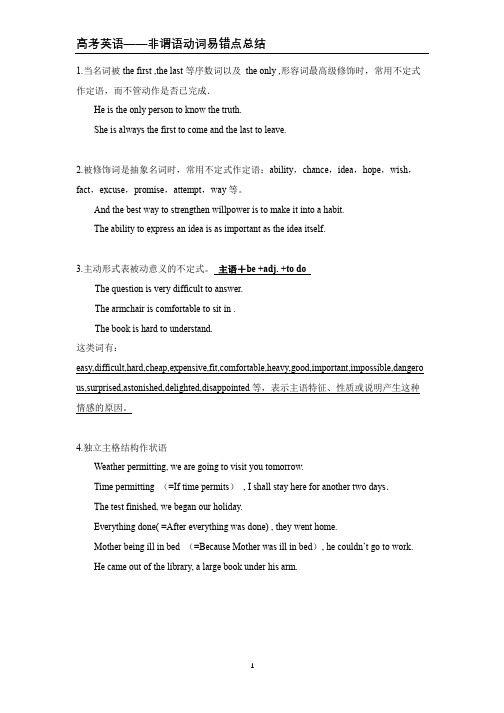
1.当名词被the first ,the last等序数词以及the only ,形容词最高级修饰时,常用不定式作定语,而不管动作是否已完成.He is the only person to know the truth.She is always the first to come and the last to leave.2.被修饰词是抽象名词时,常用不定式作定语:ability,chance,idea,hope,wish,fact,excuse,promise,attempt,way等。
And the best way to strengthen willpower is to make it into a habit.The ability to express an idea is as important as the idea itself.3.主动形式表被动意义的不定式。
主语+be +adj. +to doThe question is very difficult to answer.The armchair is comfortable to sit in .The book is hard to understand.这类词有:easy,difficult,hard,cheap,expensive,fit,comfortable,heavy,good,important,impossible,dangero us,surprised,astonished,delighted,disappointed等,表示主语特征、性质或说明产生这种情感的原因。
4.独立主格结构作状语Weather permitting, we are going to visit you tomorrow.Time permitting (=If time permits), I shall stay here for another two days.The test finished, we began our holiday.Everything done( =After everything was done) , they went home.Mother being ill in bed (=Because Mother was ill in bed), he couldn’t go to work.He came out of the library, a large book under his arm.5.表示感官的动词1感2听,5看feel / hear , listen to / see, watch, notice, observe, look atI heard her sing an English song.I heard her singing an English song when I passed her room.I see him beaten by those bad boys.6. 4个使役动词: have,make,let,get+宾语+宾补(非谓语动词)※ make/let +宾语+ do sth 迫使某人做某事,被动语态为be made to do sth He made me laugh.I was made to laugh by himLet’s go there , shall we ?※ make /let +宾语+done (动词过去分词)(使某事被做)He couldn't make himself heard above the noise of the traffic.Let he clothes washed.※ have +宾语+do sthHe had her go there.※ have+宾语+doing sth 表示动作的执行者为宾语,但是动词必须是持续性动词/延续性动词,后面常接一个时间段He had her standing in the rain for two hoursHe had us laughing all through lunch.※ have +宾语+done 表示叫,让,请别人做某事或遭遇不幸事件I will have my bike repaired this afternoonHe had his wallet stolen at the railway station.He had his pocket picked.※ get +宾语+to do sthHe got his brother to help him.※get +宾语+doing sthHe got his bike running very fast※ get +宾语+doneHe got the car started7.with 的复合结构“With + 复合结构”又称为“with结构”,在句中表状态或说明背景情况,常做伴随,方式,原因,条件等状语。
非谓语动词考点及易错点
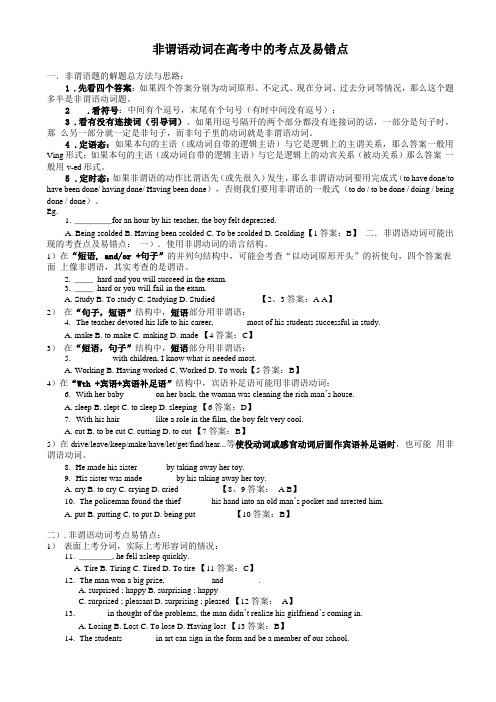
非谓语动词在高考中的考点及易错点一.非谓语题的解题总方法与思路:1.先看四个答案:如果四个答案分别为动词原形、不定式、现在分词、过去分词等情况,那么这个题多半是非谓语动词题。
2.看符号:中间有个逗号,末尾有个句号(有时中间没有逗号);3.看有没有连接词(引导词)。
如果用逗号隔开的两个部分都没有连接词的话,一部分是句子时,那么另一部分就一定是非句子,而非句子里的动词就是非谓语动词。
4.定语态:如果本句的主语(或动词自带的逻辑主语)与它是逻辑上的主谓关系,那么答案一般用Ving形式;如果本句的主语(或动词自带的逻辑主语)与它是逻辑上的动宾关系(被动关系)那么答案一般用v-ed形式。
5.定时态:如果非谓语的动作比谓语先(或先很久)发生,那么非谓语动词要用完成式(to have done/to have been done/ having done/ Having been done),否则我们要用非谓语的一般式(to do / to be done / doing / being done / done)。
Eg.1. ________ f or an hour by his teacher, the boy felt depressed.A. Being scoldedB. Having been scoldedC. To be scoldedD. Scolding【1 答案:B】二.非谓语动词可能出现的考查点及易错点:一).使用非谓动词的语言结构。
1)在“短语, and/or +句子”的并列句结构中,可能会考查“以动词原形开头”的祈使句,四个答案表面上像非谓语,其实考查的是谓语。
2.____ hard and you will succeed in the exam.3.____ hard or you will fail in the exam.A. StudyB. To studyC. StudyingD. Studied 【2、3 答案:A A】2)在“句子,短语”结构中,短语部分用非谓语:4.The teacher devoted his life to his career, ______ most of his students successful in study.A. makeB. to makeC. makingD. made 【4 答案:C】3)在“短语,句子”结构中,短语部分用非谓语:5._______ with children, I know what is needed most.A. WorkingB. Having workedC. WorkedD. To work【5 答案:B】4)在“Wth +宾语+宾语补足语”结构中,宾语补足语可能用非谓语动词:6.With her baby _______ o n her back, the woman was cleaning the rich man’s house.A. sleepB. sleptC. to sleepD. sleeping 【6 答案:D】7.With his hair ________ l ike a role in the film, the boy felt very cool.A. cutB. to be cutC. cuttingD. to cut 【7 答案:B】5)在drive/leave/keep/make/have/let/get/find/hear...等使役动词或感官动词后面作宾语补足语时,也可能用非谓语动词。
非谓语动词作状语的易错点

非谓语动词作状语的易错点1、位置问题。
(1) 非谓语动词作状语放在句首,一般会有逗号与主句隔开。
T o complete the project in time, the staff were working at weekends. (2009 天津,4) Encouraged by the advances in the technology, many farmers have set up wide farms on their land. (2009 天津,4)Tired but excited, tourists rushed to the adventurous activities.Tired but excited tourists rushed to the adventurous activities. (定语)(2) 非谓语动词作状语放在句末,有无标点,含义常不同。
They worked hard in school to enter a key college. (表目的)They worked hard in school, entering a key college. (表结果)They worked hard in schoo l, just / only to find it in vain. (表意想不到的结果)He was busy writing a story, only stopping once in a while to smoke a cigarette. (表伴随)Lucy’s new job paid twice as much as she had made working in the r e staurant. (表时间)2、逻辑主语应准确。
非谓语动词作状语,非谓语动词的逻辑主语就是主句的主语,非谓语动词的动作与主句的主语应有正确的逻辑关系:主谓或动宾关系,否则表达出来的句子就是错句。
非谓语动词易错点讲解
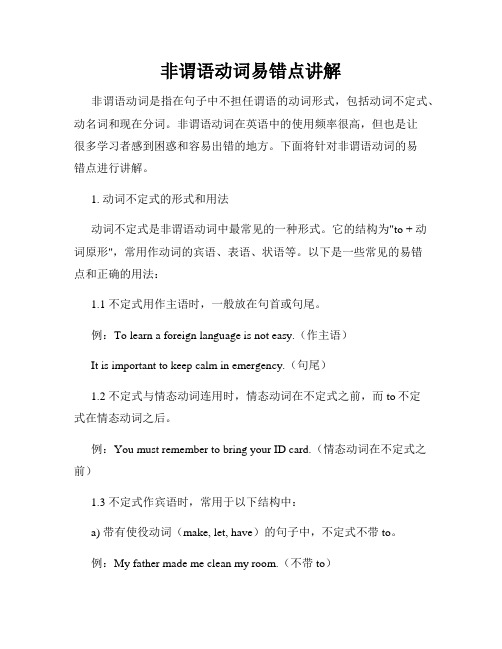
非谓语动词易错点讲解非谓语动词是指在句子中不担任谓语的动词形式,包括动词不定式、动名词和现在分词。
非谓语动词在英语中的使用频率很高,但也是让很多学习者感到困惑和容易出错的地方。
下面将针对非谓语动词的易错点进行讲解。
1. 动词不定式的形式和用法动词不定式是非谓语动词中最常见的一种形式。
它的结构为"to + 动词原形",常用作动词的宾语、表语、状语等。
以下是一些常见的易错点和正确的用法:1.1 不定式用作主语时,一般放在句首或句尾。
例:To learn a foreign language is not easy.(作主语)It is important to keep calm in emergency.(句尾)1.2 不定式与情态动词连用时,情态动词在不定式之前,而to不定式在情态动词之后。
例:You must remember to bring your ID card.(情态动词在不定式之前)1.3 不定式作宾语时,常用于以下结构中:a) 带有使役动词(make, let, have)的句子中,不定式不带to。
例:My father made me clean my room.(不带to)b) 动词感官(see, watch, hear)和感受(feel)后,不定式需带to。
例:I heard her sing in the competition.(带to)1.4 不定式作定语时,修饰名词或代词,位置在被修饰词之后。
例:I have a book to read.(修饰名词)The man to whom I spoke is my teacher.(修饰代词)2. 动名词的形式和用法动名词是以-ing结尾的非谓语动词形式,它可以作主语、宾语、表语、定语等。
以下是一些常见的易错点和正确的用法:2.1 动名词作主语时,谓语动词要用单数形式。
例:Swimming is my favorite hobby.(动名词作主语)2.2 动名词作宾语时,常常跟随某些动词(enjoy, avoid, finish, suggest等)之后。
非谓语动词总结以及易错点
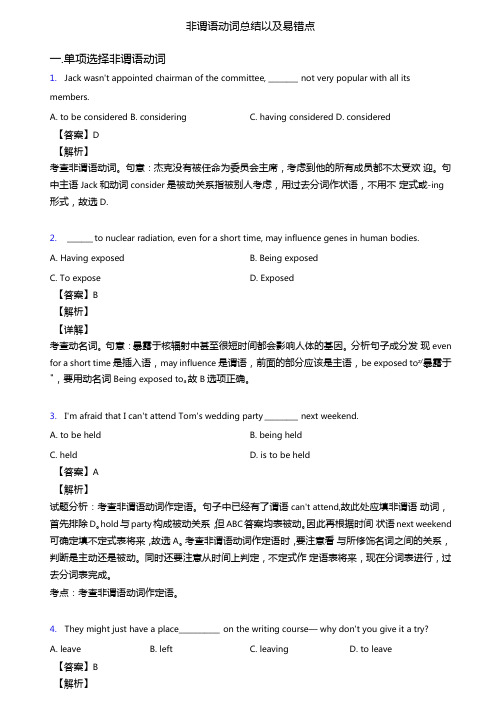
非谓语动词总结以及易错点一.单项选择非谓语动词1.Jack wasn't appointed chairman of the committee, ________ not very popular with all its members.A. to be consideredB. consideringC. having consideredD. considered【答案】D【解析】考查非谓语动词。
句意:杰克没有被任命为委员会主席,考虑到他的所有成员都不太受欢迎。
句中主语Jack和动词consider是被动关系指被别人考虑,用过去分词作状语,不用不定式或-ing 形式,故选D.2. _______ to nuclear radiation, even for a short time, may influence genes in human bodies.A. Having exposedB. Being exposedC. To exposeD. Exposed【答案】B【解析】【详解】考查动名词。
句意:暴露于核辐射中甚至很短时间都会影响人体的基因。
分析句子成分发现even for a short time是插入语,may influence是谓语,前面的部分应该是主语,be exposed to z/暴露于",要用动名词Being exposed to a故B选项正确。
3.I'm afraid that I can't attend Tom's wedding party _________ next weekend.A. to be heldB. being heldC. heldD. is to be held【答案】A【解析】试题分析:考查非谓语动词作定语。
句子中已经有了谓语can't attend,故此处应填非谓语动词,首先排除D。
非谓语的常见误用情况

非谓语的常见误用情况由于自身的特点和复杂性,非谓语动词是较难掌握语法项目之一,也是各类考题热点命题方向。
非谓语动词内容很多,因此命题的知识点也有很多。
各类考题除了考查非谓语动词的基本功能外,还考查非谓语动词的形式变化以及动词与非谓语动词的不同搭配等。
易错点回顾:1. 下面短语中的to是介词,后面只能跟名词或动名词:devote oneself/one’s time, energy, etc. to(投入……),get down to(着手干……),lead to (通向,导致),object to(反对),pay attention to (注意),look forward to (盼望),be used to (习惯于),stick to (坚持)等。
此种情况分类如下:一、动词+介词to+动名词1. admit to doing sth 承认做了某事2. apply to doing sth 适用于做某事3. object to doing sth 反对做某事4. see to doing sth 负责做某事5. stick to doing sth 坚持做某事6. take to doing sth 喜欢上做某事,逐渐习惯做某事。
7. lead to通向8. see to 负责二、动词+宾语+介词to+动名词9.devote oneself to doing sth专心致力于做某事把……献给做某事;献身于做某事10. limit sth to doing sth 把…限制在做某事的范围内11. reduce sb to doing sth 使某人沦为做某事12. give one’s life to doing sth 献身于做某事13. give one’s mind to doing sth 专心做某事14. have a dislike to doing sth 厌恶做某事15. have an eye to doing sth 注意做某事15. have an eye to doing sth16. have an objection to doing sth 反对(反感)做某事17. pay attention to doing sth 注意做某事18. set one’s mind to doing sth 决心做某事三、be+形容词(含过去分词)+介词to+动名词19. be equal to doing sth 等于做某事,能胜任做某事20. be used to doing sth 习惯于做某事21. be opposed to doing sth 反对做某事22. be reduced to doing sth使某人沦为做某事23. be devoted to doing sth 把时间(钱,精力等)献给做某事24. be limited to doing sth把……限制在做某事的范围内四、其他结构+介词to+动名词25. get down to doing sth开始做某事,认真处理某事26. look forward to doing sth 盼望做某事五、to作介词(后接名词、动名词)短语一览be / get / become used to 习惯于be given to 喜欢;癖好be related to 与…有关系be addicted to 沉溺于;对…上瘾be opposed to 反对devote oneself to献身于;专心于be devoted to 致力于;忠诚于be admitted to 被…录取;准进入be reduced to 沦为reduce…to…使…沦为be attached to附属于;喜欢;依恋be adjusted to 适应be known to 为…所知be married to 和…结婚be sentenced to被判处be connected to 和…连在一起be exposed to 暴露于;遭受be compared to 被比喻成compare… to…把…比作…be engaged to 与…订婚be / become / get accustomed to accustomed to 惯于;有…习惯be engaged to 与…订婚get down to 着手做lead to 导致object to反对;不喜欢;不赞成put one’s mind to全神贯注于give rise to 引起look forward to 盼望stick to 坚持pay attention to 注意attend to 专心;注意;照料see to 负责;注意contribute to对…作贡献;有助于make contributions to对…作贡献apply oneself to 致力于come close to几乎;将近reply to 回答add to 增加add up to 加起来in addition to除…之外turn to转向;求助于feel up to 能胜任于look up to 尊敬admit to承认belong to 属于take to 喜爱;开始cling to 附着fall to 开始respond to 回答;对…作出回应accustom oneself to 使自己习惯于amount to等于prefer… to…更喜欢set an example to 给…树立榜样refer to 谈到;参考;查阅agree to sth. 同意某事(比较:agree to do sth. 同意做某事)prefer… to…更喜欢take / make a trip to到…地方去join…to…把…和…连接起来turn a blind eye to对…视而不见turn a deaf ear to 对…充耳不闻show honor to向…表示敬意put an end to(bring… to an end) 结束set fire to 放火烧……drink (a toast) to 为……干杯propose a toast to 提议……happen to… 发生了……事occur to sb. 想起;想到total up to 总计达be close to 几乎;将近hold to 坚持;抓住help oneself to 随便用……hold on to 抓住;固守do harm to 对……有害处do wrong to 冤枉某人date back to 追溯到when it comes to… 谈到……时come to 来到;达到;结果为 (比较:come to do sth逐渐做某事)give an eye to着眼于have an eye to doing 打算the key to ……的答案describe to 向……描述treat sb. to sth. 请某人吃……trust sth. to sb.把某物委托给某人pay a visit to 参观……access to 进入;取得的方法be a stranger to 不习惯;对……陌生on one’s way to 在去某处的路上;在达成某事的过程中be kind to 对……和善be important to 对……重要be senior to 年龄长于……be equal to 和……相等be particular to ……所特有的(比较:be particular about 对……过于讲究;挑剔)be subject to 服从;隶属;易遭\受\患be familiar to 为……熟悉be similar to 和……相似be open to 对……开放be loyal to 对……忠诚be helpful to对……有益处be useful to对……有用be good to sb对某人好(比较:be good for 对……有益处)be bad to 对……不好be bad for(比较:对……有害处)be new to 对……不习惯;对……陌生as to 关于;至于next to(否定词前)几乎;be due to do sth.预定要做某事next to ……的旁边due to 由于;归因于……thanks to 多亏了;由于owing to 由于;因……的缘故in / with regard to 关于in /with relation to 关于;就……而论subject to 在……条件下;依照be given to 沉溺于be related to 与…相关get down to着手做lead to 着手做object to / be opposed to 反对p ut one’s mind to全神贯注于be equal to 胜任devote oneself to献身于give rise to 引起look forward to 盼望pay attention to 注意be addicted to 沉溺于…对…上瘾according to 根据access to 接近(某地的)方法contribute to 为…作贡献[误]His whole family objected to his give up the job.[正]His whole family objected to his giving up the job.2. 下列动词后只能跟不定式:afford, agree, ask, attempt, choose, decide, hope, expect, intend, learn, long, manage, offer, plan, pretend, promise, refuse, want, wish等。
非谓语动词易错点.doc
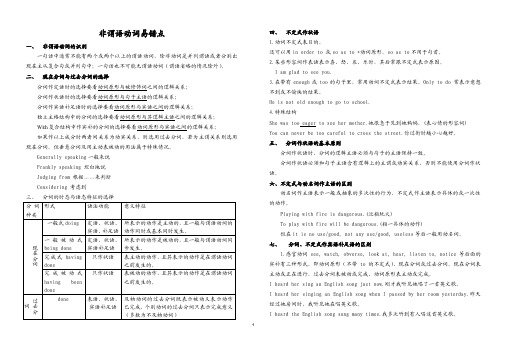
非谓语动词易错点一、非谓语动词的识别一句话中通常不能有两个或两个以上的谓语动词,除非动词是并列谓语或者分别出现在主从复合句或并列句中;一句话也不可能无谓语动词(谓语省略的情况除外)。
二、现在分词与过去分词的选择分词作定语时的选择要看动词原形与被修饰词之间的逻辑关系;分词作状语时的选择要看动词原形与句子主语的逻辑关系;分词作宾语补足语时的选择要看动词原形与宾语之间的逻辑关系;独立主格结构中的分词的选择要看动词原形与其逻辑主语之间的逻辑关系;With复合结构中作宾补的分词的选择要看动词原形与宾语之间的逻辑关系;如果作以上成分时两者间关系为动宾关系,则选用过去分词,若为主谓关系则选用现在分词。
但垂悬分词及用主动表被动的用法属于特殊情况。
Generally speaking一般来说Frankly speaking 坦白地说Judging from 根据……来判断Considering 考虑到三、分词的时态与语态特征的选择四、不定式作状语1.动词不定式表目的。
还可以用in order to 或so as to +动词原形。
so as to不用于句首。
2.某些形容词作表语表示喜、怒、哀、乐时,其后常跟不定式表示原因。
I am glad to see you.3.在带有enough或too的句子里,常用动词不定式表示结果。
Only to do 常表示意想不到或不愉快的结果。
He is not old enough to go to school.4.特殊结构She was too eager to see her mother.她很急于见到她妈妈。
(表心情的形容词) You can never be too careful to cross the street.你过街时越小心越好。
五、分词作状语的基本原则分词作状语时,分词的逻辑主语必须与句子的主语保持一致。
分词作状语必须和句子主语含有逻辑上的主谓或动宾关系,否则不能使用分词作状语。
非谓语动词总结以及易错点
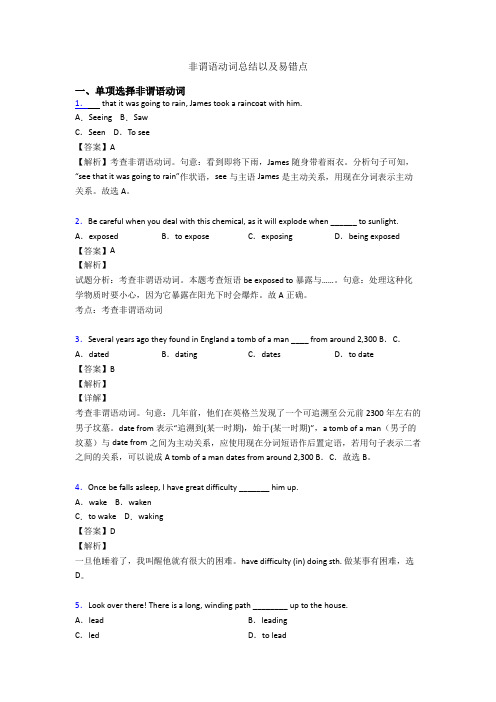
非谓语动词总结以及易错点一、单项选择非谓语动词1. that it was going to rain, James took a raincoat with him.A.Seeing B.SawC.Seen D.To see【答案】A【解析】考查非谓语动词。
句意:看到即将下雨,James随身带着雨衣。
分析句子可知,“see that it was going to rain”作状语,see与主语James是主动关系,用现在分词表示主动关系。
故选A。
2.Be careful when you deal with this chemical, as it will explode when ______ to sunlight. A.exposed B.to expose C.exposing D.being exposed【答案】A【解析】试题分析:考查非谓语动词。
本题考查短语be exposed to暴露与……。
句意:处理这种化学物质时要小心,因为它暴露在阳光下时会爆炸。
故A正确。
考点:考查非谓语动词3.Several years ago they found in England a tomb of a man ____ from around 2,300 B.C.A.dated B.dating C.dates D.to date【答案】B【解析】【详解】考查非谓语动词。
句意:几年前,他们在英格兰发现了一个可追溯至公元前2300年左右的男子坟墓。
date from表示“追溯到(某一时期),始于(某一时期)”,a tomb of a man(男子的坟墓)与date from之间为主动关系,应使用现在分词短语作后置定语,若用句子表示二者之间的关系,可以说成A tomb of a man dates from around 2,300 B.C.故选B。
4.Once be falls asleep, I have great difficulty _______ him up.A.wake B.wakenC.to wake D.waking【答案】D【解析】一旦他睡着了,我叫醒他就有很大的困难。
高考英语非谓语动词易错知识点总结
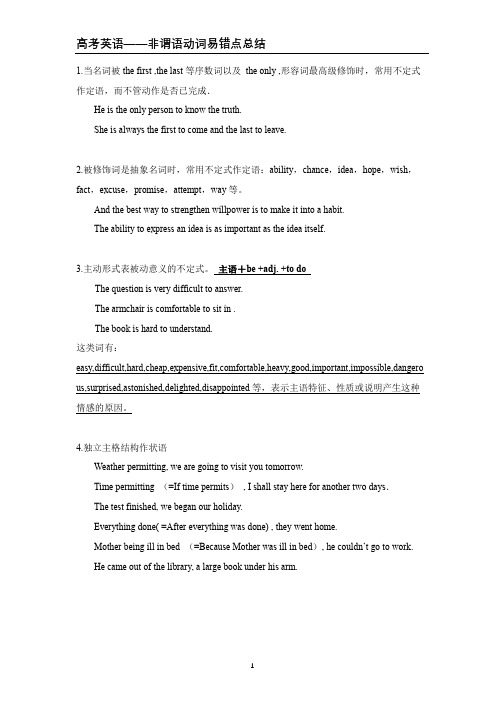
1.当名词被the first ,the last等序数词以及the only ,形容词最高级修饰时,常用不定式作定语,而不管动作是否已完成.He is the only person to know the truth.She is always the first to come and the last to leave.2.被修饰词是抽象名词时,常用不定式作定语:ability,chance,idea,hope,wish,fact,excuse,promise,attempt,way等。
And the best way to strengthen willpower is to make it into a habit.The ability to express an idea is as important as the idea itself.3.主动形式表被动意义的不定式。
主语+be +adj. +to doThe question is very difficult to answer.The armchair is comfortable to sit in .The book is hard to understand.这类词有:easy,difficult,hard,cheap,expensive,fit,comfortable,heavy,good,important,impossible,dangero us,surprised,astonished,delighted,disappointed等,表示主语特征、性质或说明产生这种情感的原因。
4.独立主格结构作状语Weather permitting, we are going to visit you tomorrow.Time permitting (=If time permits), I shall stay here for another two days.The test finished, we began our holiday.Everything done( =After everything was done) , they went home.Mother being ill in bed (=Because Mother was ill in bed), he couldn’t go to work.He came out of the library, a large book under his arm.5.表示感官的动词1感2听,5看feel / hear , listen to / see, watch, notice, observe, look atI heard her sing an English song.I heard her singing an English song when I passed her room.I see him beaten by those bad boys.6. 4个使役动词: have,make,let,get+宾语+宾补(非谓语动词)※ make/let +宾语+ do sth 迫使某人做某事,被动语态为be made to do sth He made me laugh.I was made to laugh by himLet’s go there , shall we ?※ make /let +宾语+done (动词过去分词)(使某事被做)He couldn't make himself heard above the noise of the traffic.Let he clothes washed.※ have +宾语+do sthHe had her go there.※ have+宾语+doing sth 表示动作的执行者为宾语,但是动词必须是持续性动词/延续性动词,后面常接一个时间段He had her standing in the rain for two hoursHe had us laughing all through lunch.※ have +宾语+done 表示叫,让,请别人做某事或遭遇不幸事件I will have my bike repaired this afternoonHe had his wallet stolen at the railway station.He had his pocket picked.※ get +宾语+to do sthHe got his brother to help him.※get +宾语+doing sthHe got his bike running very fast※ get +宾语+doneHe got the car started7.with 的复合结构“With + 复合结构”又称为“with结构”,在句中表状态或说明背景情况,常做伴随,方式,原因,条件等状语。
- 1、下载文档前请自行甄别文档内容的完整性,平台不提供额外的编辑、内容补充、找答案等附加服务。
- 2、"仅部分预览"的文档,不可在线预览部分如存在完整性等问题,可反馈申请退款(可完整预览的文档不适用该条件!)。
- 3、如文档侵犯您的权益,请联系客服反馈,我们会尽快为您处理(人工客服工作时间:9:00-18:30)。
非谓语动词易错点1.感官动词see,watch,observe,look at,hear,listen to,notice等和使役动词have后面的宾补有四种形式:当宾语与宾语补足语之间存在逻辑上的主动关系时,需用动词原形(即不带to的不定式)及doing(v.-ing形式一般主动式)。
不带to的不定式表完成,v.-ing形式一般主动式表正在进行;当宾语与宾语补足语之间存在逻辑上的被动关系时,需用v.-ed分词及being done(v.-ing形式一般被动式)。
v.-ed分词表完成或没有一定的时间性,v.-ing形式一般被动式表正在进行。
I heard her sing an English song just now.刚才我听见她唱了一首英文歌。
(主动,完成)I heard her singing an English song when I passed by her room yesterday.昨天经过她房间时,我听见她在唱英文歌。
(主动,正在进行)I heard an English song being sung by a little girl when I passed by her room yesterday.昨天经过她房间时,我听见一个小女孩正在唱英文歌。
(被动,正在进行)I found him tied to a big tree.我发现他被捆在一颗大树上。
(2008·江苏高考)To learn English well,we should find opportunities to hear English as much as we can.A.speakB.speakingC.spokenD.to spoken选 句意:为了把英语学好,我们应当尽可能抓住一切机会去听别人讲英语。
本题关键要意识到English和speak之间是被动关系,故选C。
注意:有些动词接动名词作宾语, 可用下列方式帮助记忆归纳:避免 错过 少延期 (avoid, miss, put off/postpone)建议 完成 多练习( suggest, finish, practice)喜欢 想像 禁不住( enjoy, imagine, can’t help)承认 否定 与嫉妒( admit, deny, envy)逃避 冒险 莫原谅 (escape, risk, excuse)忍受 保持 别介意(stand, keep, mind)2.leave后接非谓语动词作宾补时,意为“使……处于某种状态”。
(1)leave sb.doing sth.让某人一直做某事(宾语与宾补之间是逻辑上的主动关系,表示动作正在进行)It's wrong of you to leave the machine running.你让机器一直开着是不对的。
(主动,正在进行)(2)leave sth.undone留下某事未做(宾语与宾补之间是逻辑上的被动关系,表示被动和完成),一般以undone,unfinished,unsettled,untouched为多。
The guests left most of the dishes untouched,because they didn't taste delicious.大部分的菜客人们没有动,因为它们不可口。
(被动,完成)He left,leaving me to do all the rest of the work.他走了,留下我一个人去做剩余的所有工作。
(主动,将来)We hurriedly ended our meeting,leaving many problems to be settled.我们匆匆忙忙地结束了会议,留下了很多问题等待解决。
(被动,将来)3.have,get后接三种形式作宾补时,其中have,get表示 “使、让、叫”之意。
(1)have sth.done=get sth.done使/让某事由别人去做(叫/ 让某人做某事)I'll have/get my bike repaired tomorrow. 我明天得(请人)修一下我的自行车。
此外,have sth.done还表示“使遭受……”之意。
Tom had his leg broken while playing football.汤姆踢足球时,伤了腿。
Mr.Smith had his house broken into while he was away on holiday.史密斯先生在度假期间,他家的房子被别人破门而入。
The captain got the soldiers moving towards the front after a short rest.休息了片刻之后,上尉让士兵们开始朝前线行进起来。
[注意] have sb.doing若用于否定句中,其中have有“容忍”之意。
I won't have you speaking to your dad like that.我不允许你和你父亲那样讲话。
Mother had me go to the shop and buy some salt妈妈让我去商店买些食盐。
(2009·重庆高考)With the world changing fast,we have something new with all by ourselves every day.A.dealB.dealtC.to dealD.dealing选 本题考查不定式作定语。
句意:随着世界的快速变化,我们每天都有新的问题要独自处理。
have something to deal,动词deal逻辑上的主语是we,也就是句子的主语。
故选C。
4.动词like,love,prefer后接不定式或v.-ing形式作宾语均可。
如表示经常性的行为常用v.-ing形式,如表示具体的行为常用动词不定式。
但要注意:如果like,love,prefer前有 would/should时,后面则应接动词不定式作宾语。
feel like 后接v.-ing形式作宾语。
I like swimming,but I don't like to swim this afternoon.我喜欢游泳,但今天下午不想游泳。
I would like to have a cup of coffee.我想喝杯咖啡。
We all feel like celebrating.我们都想庆祝一番。
5.在动词allow,advise,forbid,permit后直接跟v.-ing形式作宾语,如果后面有名词或代词作宾语,其后用动词不定式作宾语补足语。
allow/permit/forbid/adviseSmoking is forbidden here but you are allowed to smoke.这里禁止吸烟,但你可以吸。
We don't allow smoking in the hall.我们不准在大厅内吸烟。
6.动词need,require,want作“需要”解时。
其后必须用v.-ing形式的主动形式或不定式的被动形式作宾语,表示事情需要做。
这时v.-ing形式的主动式表示被动意义。
be worth后必须用v.-ing形式的主动形式表示被动意义。
此外,若动词need表“需要”,require表“要求”,want表“想要”这些意义时,其后须接名词或代词作宾语,然后接不定式作宾语补足语。
(2007·陕西高考)As a result of the serious flood,two-thirds of the buildings in the area .A.need repairingB.needs to repairC.needs repairingD.need to repair选 分数、百分数修饰名词,谓语动词的单复数取决于名词,此处two-thirds修饰buildings,故谓语动词取决于名词复数buildings,排除B、C两项;need doing=need to be done意为“需要被做”。
故选A。
7.动词不定式在介词but,other than后面时。
如果介词之前有行为动词do 的某种形式,那么介词后的不定式不带to,否则就要带to。
另外在can't choose but,can't help but(只好),can't but(只好),had better,would rather后面的不定式也要省略to。
I cannot but agree to his terms.我只好赞同他的条件。
All I could do was go home.我能做的事是回家。
We could do nothing but/other than wait除了等之外我们什么也不能做。
We had nothing to do but/other than wait.除了等之外我们什么事也不能做。
We had no choice but to wait.除了等之外我们别无选择。
8.独立主格结构独立主格结构,就是分词有其自己的独立主语,可以不与句子的主语保持一致。
独立主格结构没有主语和谓语,所以在语法上不是句子。
此结构在句子中起原因、方式、时间、条件、伴随状语的作用。
独立主格结构应与句子的主体部分分隔开来。
其功能和用法见下表:。
